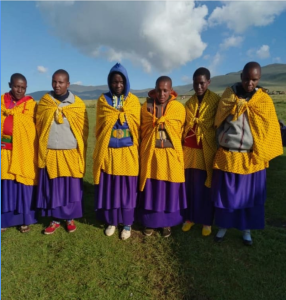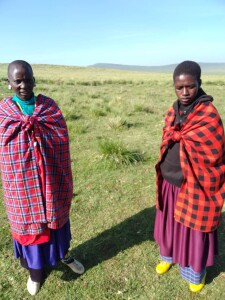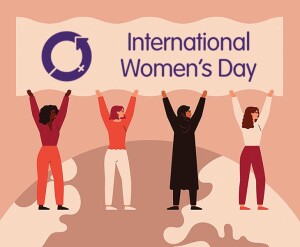Local Livelihoods for Women Lead to Thriving Communities
Mar 7th, 2021 | By admin | Category: Featured, Other ResourcesBy Suzanne York.

Six special Maasai ladies wearing special shukas for a special occasion: Student Celebration. These are Maasai Harmonial’s two medical interpreters (left) and four craft leaders (right)
For most people, having a job is critical beyond just income and a way out of poverty. Being employed elevates feelings of self-worth and a sense of having a purpose, of being valued and giving something back to one’s community. Too many people don’t get a chance to do so, especially women (beyond taking care of households, which is a whole other topic). From a women’s rights perspective, empowering women with sustainable livelihoods is a major way to improve their lives and that of their families, and it benefits the community as a whole.
According to the World Bank, women and girls have a unique role to play as drivers of growth and progress and powerful agents of change. Globally, women are accorded only three-quarters of the legal rights that men enjoy. This constrains their ability to get jobs or start businesses and make economic decisions that are best for them and their families. These difficulties are compounded for rural women, who often lack access to both information and finance.
In the Maasai community of Emburbul, in northern Tanzania, local women are finding livelihoods in a variety of areas. With the help of Maasai Harmonial & Development Society (MHDS), a community-based NGO, women are working in craft-making, beading, and sewing. They are even creating specific products for girls and women, such as aprons for traditional birthing attendants and menstrual pads. And during this long COVID period, they have been making masks. When tourism returns to Tanzania, the craft industry will help provide a livelihood to the community women.
One type of job in particular is having a big impact on women’s health and well-being.
Medical interpreters are helping other women not only understand what they are being told by health professionals, but to also access healthcare. The Emburbul community has two female medical interpreters who travel with women to health facilities. They have been to high school and understand Swahili, which is critical, as the doctors often don’t understand the Maa language of the Maasai people. They’ve learned medical terms and conditions, and have increased their knowledge of family planning services.
Without the local medical interpreters, the community women will not go to the clinic because they don’t know what they are being told to do. When it comes to childbirth, women often opt to give birth at home instead of in the hospital, which is safer.
Voluntary family planning also plummeted before these two women started offering interpreter services. For some time, the contraceptive prevalence rate (CPR) in this area was fairly high, at approximately 43 percent. After a doctor who spoke the local language retired, the clinic health report showed a dramatic decrease in the CPR, to 18 percent, because the new doctor and patients didn’t understand one another.
The interpreters accompany women from the village to the clinic. They earn $40/month for this service, and the two women take turns. They often help out other villagers too. The current doctor appreciates the service.
When Nemburis Ormetily, one of the interpreters, was asked what she liked about her work, she said she really liked understanding medicine and knowing about different diseases. Her life had changed after becoming an interpreter “because I know now to measure different diseases, and I know a variety of diseases, symptoms and precautions. I know diseases like HIV Aids, malaria, gonorrhea, and so many others.” She went on to say that “Women are very happy with our interpretation because they can’t always tell the doctor by their actions what hurts, but they can tell us why they are sick and translate it to them.”
It’s a proverbial win-win for the women, community and health professionals. The women have jobs, are excited to learn something new and offer a critical service to their community. Doctors can have some certainty that their instructions will be understood and hopefully followed.
Lastly, this also underscores the importance of working from the ground up and knowing all the nuances that can arise. An important service can be provided by the government or NGO but if it’s driven by a mis-guided assumption – such as everyone understands the dominant language – then it will likely fail.
A local community knows best. For Emburbul, Maasai Harmonial & Development Society saw the need and is improving lives with sustainable livelihoods, women’s empowerment and healthcare. As the world recognizes this International Women’s Day, knowing that local women hold the keys to improving lives is a solution more people need to get behind.
Suzanne York is Director of Transition Earth.
Photos provided by MHDS.


